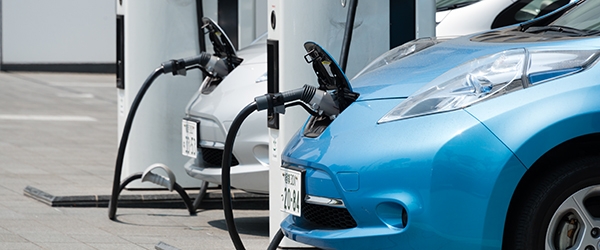Electric Vehicle Policies Targeting Low-income Drivers Would Be Most Effective, New Report Finds

A new report from Portland State University's Institute for Sustainable Solutions suggests that the most effective policies to support the growth of electric vehicles in the City of Portland would be those that target low-income drivers. The report is part of a collaborative project between Portland State University and the City of Portland Bureau of Planning and Sustainability to further goals in the Portland Climate Action Plan.
THE RESEARCH TEAM
The collaborative research team included Ingrid Fish from the Portland Bureau of Planning and Sustainability; John MacArthur and Kelly Clifton, who are both ISS Faculty Fellows and core researchers in PSU's Transportation Research and Education Center (TREC); Joseph Broach, a research associate in TREC; and Baxter Shandobil, a transportation planning student in PSU's Master of Urban and Regional Planning program.
METHODOLOGY
The team set out to investigate how shifting electric vehicle policies to be more inclusive of low-income populations and communities of color might not only reduce carbon emissions but also produce co-benefits such as fuel savings, lower maintenance costs, and improved mobility.
The report provides city officials with helpful information as they work to increase electric vehicle awareness, expand access to vehicle options and charging infrastructure, and support electric vehicle-related innovation as part of their 2017 Electric Vehicle Strategy and larger Climate Action Plan.
The research team analyzed the characteristics and usage patterns of personal vehicles in the Portland metro region using local, state, and federal data sources, and outlined possible policy scenarios to estimate the benefits that would result from replacing some cars with either hybrid or electric vehicles.
KEY FINDINGS
They found that, contrary to some perceptions, lower-income populations didn't necessarily drive more or drive less fuel-efficient cars than higher-income groups. But unsurprisingly, electric-vehicle ownership was concentrated in higher-income, mostly white groups.
Possible scenarios examined by the report included:
- Replacing 10 percent of clunkers with hybrid or electric vehicles region-wide, region-wide but with a bias toward lower median income areas, and in areas where the average age of vehicles was oldest
- Replacing 10 percent of gas-guzzlers region-wide, region-wide but with a bias toward lower median income areas, and in areas where the average vehicle efficiency was lowest
- Replacing 10 percent of high-mileage cars region-wide, region-wide but with a bias toward lower median income areas, and in areas where the vehicle-miles traveled was highest
The study found that strategies that targeted high-use and low-efficient vehicles appeared to be the most effective. John MacArthur, a co-author of the study, said the "low-income area first" strategy had about the same results as the region-wide targeting but had the added benefit of redirecting fuel savings and mobility benefits to lower-income groups.
"There are significant benefits for encouraging the adoption of electric vehicles or hybrids, and by doing this with an equity focus, you can achieve much of the same results that you would with a broader policy but there's all these other benefits," MacArthur said.
Electric cars are cheaper to fuel and because they don't have gas engines, they don't require regular oil changes or engine filter replacements. The parts get less wear, too, said MacArthur, who also serves as the sustainable transportation program manager for PSU's Transportation Research and Education Center.
"That money means more to them than other parts of the population and helps them with other expenses," he said. "It's like getting a double positive effect."
The report adds there are likely benefits even to households that do not participate in such programs or do not own a vehicle at all, including reduced air pollution and infrastructure that would support vehicle-sharing programs.
The report also estimates that subsidies of up to $1,803 could be justified to replace conventional gas-powered vehicles with electric cars, but it remains unclear where that money would come from and if it would be effective.
MacArthur says future research might explore the outcomes of specific policies.
"Our base assumption is we're going to replace a gas car with an electric vehicle, but how do we do that? Is it through a cash incentive, additional awareness, placement of charging infrastructure, or electric ride-sharing initiatives?" he said. "There's a lot of different policies that could be put in place to get these outcomes, but we haven't really explored what those could be."
The report was funded by a grant from the Institute for Sustainable Solutions and is one of several projects sponsored by ISS to collaborate with the City of Portland to support green infrastructure, resilience, and climate-related planning. ISS is also providing support to the city as it updates its Climate Action Plan with an eye toward incorporating social equity in its efforts to prepare for climate change.
LEARN MORE
To learn more about this and other transportation research, sign up for our monthly newsletter.
The Transportation Research and Education Center (TREC) at Portland State University is home to the National Institute for Transportation and Communities (NITC), the Initiative for Bicycle and Pedestrian Innovation (IBPI), and other transportation programs. TREC produces research and tools for transportation decision makers, develops K-12 curriculum to expand the diversity and capacity of the workforce, and engages students and young professionals through education.
